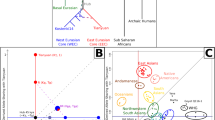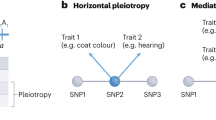Abstract
Arising from M. A. Nowak, C. E. Tarnita & E. O. Wilson Nature 466, 1057–1062 (2010)10.1038/nature09205; Nowak et al. reply
The paper by Nowak et al.1 has the evolution of eusociality as its title, but it is mostly about something else. It argues against inclusive fitness theory and offers an alternative modelling approach that is claimed to be more fundamental and general, but which, we believe, has no practical biological meaning for the evolution of eusociality. Nowak et al.1 overlook the robust empirical observation that eusociality has only arisen in clades where mothers are associated with their full-sibling offspring; that is, in families where the average relatedness of offspring to siblings is as high as to their own offspring, independent of population structure or ploidy. We believe that this omission makes the paper largely irrelevant for understanding the evolution of eusociality.
This is a preview of subscription content, access via your institution
Access options
Subscribe to this journal
Receive 51 print issues and online access
$199.00 per year
only $3.90 per issue
Buy this article
- Purchase on Springer Link
- Instant access to full article PDF
Prices may be subject to local taxes which are calculated during checkout
Similar content being viewed by others
References
Nowak, M. A., Tarnita, C. E. & Wilson, E. O. The evolution of eusociality. Nature 466, 1057–1062 (2010)
Inward, D. J. G., Vogler, A. P. & Eggleton, P. A comprehensive phylogenetic analysis of termites (Isoptera) illuminates key aspects of their evolutionary biology. Mol. Phylogenet. Evol. 44, 953–967 (2007)
Hughes, W. O. H., Oldroyd, B. P., Beekman, M. & Ratnieks, F. L. W. Ancestral monogamy shows kin selection is key to the evolution of eusociality. Science 320, 1213–1216 (2008)
Wilson, E. O. The Insect Societies (Belknap Press of Harvard Univ. Press, 1971)
Hamilton, W. D. The genetical evolution of social behaviour, I & II. J. Theor. Biol. 7, 1–52 (1964)
Alexander, R. D. The evolution of social behavior. Annu. Rev. Ecol. Syst. 5, 325–383 (1974)
Charnov, E. L. Evolution of eusocial behavior: offspring choice or parental parasitism? J. Theor. Biol. 75, 451–465 (1978)
Boomsma, J. J. Kin selection versus sexual selection: Why the ends do not meet. Curr. Biol. 17, R673–R683 (2007)
Mayr, E. Cause and effect in biology. Science 134, 1501–1506 (1961)
Tinbergen, N. On aims and methods of ethology. Z. Tierpsychol. 20, 410–433 (1963)
Baer, B. Sexual selection in Apis bees. Apidologie (Celle) 36, 187–200 (2005)
den Boer, S. P. A. et al. Prudent sperm use by leaf-cutter ant queens. Proc. R. Soc. Lond. B 276, 3945–3953 (2009)
Wilson, E. O. One giant leap: How insects achieved altruism and colonial life. Bioscience 58, 17–25 (2008)
Cornwallis, C. K., West, S. A., Davis, K. E. & Griffin, A. S. Promiscuity and the evolutionary transition to complex societies. Nature 466, 969–972 (2010)
Author information
Authors and Affiliations
Contributions
J.J.B. took the initiative for this contribution and wrote the first draft. All co-authors provided written and/or oral comments that helped shape the final submission.
Corresponding author
Ethics declarations
Competing interests
Competing financial interests: declared none.
Rights and permissions
About this article
Cite this article
Boomsma, J., Beekman, M., Cornwallis, C. et al. Only full-sibling families evolved eusociality. Nature 471, E4–E5 (2011). https://doi.org/10.1038/nature09832
Received:
Accepted:
Published:
Issue Date:
DOI: https://doi.org/10.1038/nature09832
This article is cited by
-
Genetic relatedness and its causal role in the evolution of insect societies
Journal of Biosciences (2019)
-
Evolutionary transitions towards eusociality in snapping shrimps
Nature Ecology & Evolution (2017)
-
Dynamics of sex ratio, fresh weight and nutrient contents at five developmental stages of alates in the subterranean termite Reticulitermes chinensis
Insectes Sociaux (2015)
Comments
By submitting a comment you agree to abide by our Terms and Community Guidelines. If you find something abusive or that does not comply with our terms or guidelines please flag it as inappropriate.



